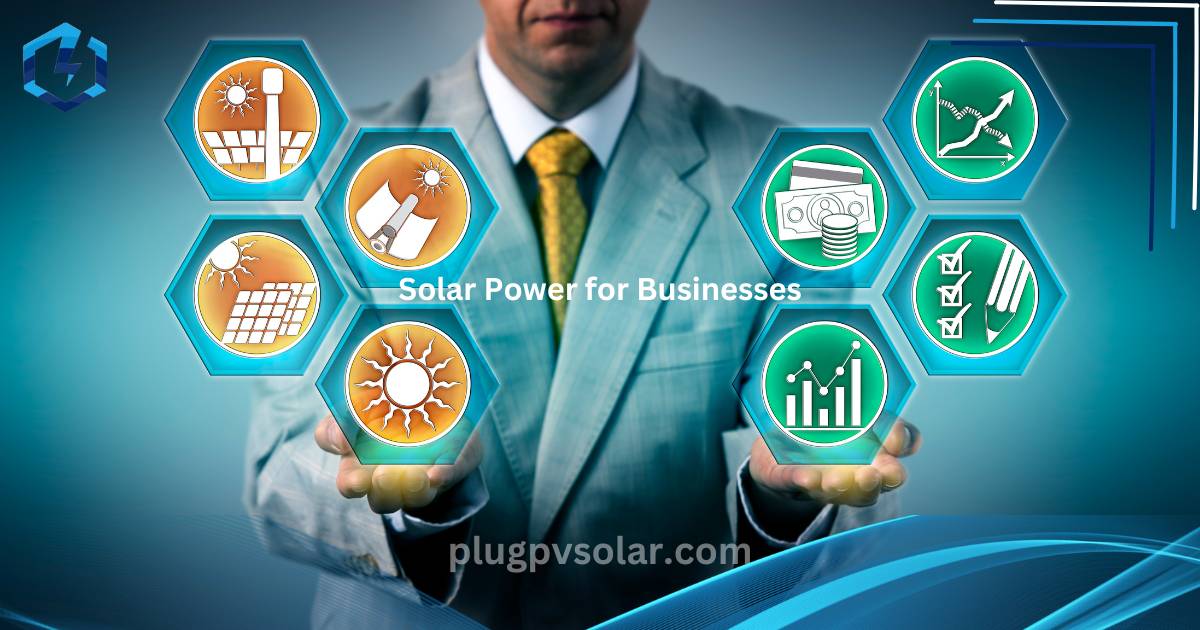
Harness solar power for businesses: why it's a game changer
Business solar power is more than just a fad. It’s a game-changing tactic that’s revolutionizing how businesses handle their energy requirements. In the modern world, where cost-effectiveness and sustainability go hand in hand, solar energy for corporate operations is not only wise financially but also environmentally. We will examine the nuances of solar power for businesses in this guide, including its advantages, how it is installed, how to finance it, and much more.
Recognizing Solar Power
Photovoltaic (PV) cells are used to harness solar radiation and turn it into electrical power. Usually composed of silicon, these cells use the photovoltaic effect to produce energy. In essence, sunlight excites electrons in the cells. Generate an electric current. Then, companies of various sizes, from startups to multinationals, can use this electricity to run their businesses.
Benefits of Solar Power for Business
Cost reductions:
The possibility of large energy bill reductions is one of the main advantages of solar power for businesses. Businesses can lock in reduced electricity bills and lessen their need for traditional energy sources by producing their own electricity.
Environmental Impact:
Businesses that use solar electricity are able to lower the effects of climate change and their carbon footprint. Businesses may show their commitment to sustainability. It helps to create a healthy planet by using clean, renewable energy sources.
Energy Independence:
By lowering a company’s reliance on the grid, solar power gives them more energy independence. This resilience can be especially helpful when there are power outages or shortages in the grid.
Solar Power System Types
Grid-tied Systems:
These systems enable businesses to use solar energy while still having access to grid electricity when necessary. They are connected to the local utility grid.
Off-grid Systems:
Perfect for companies situated in isolated locations without access to conventional power infrastructure. Off-grid systems function autonomously from the utility grid.
Hybrid Systems:
It provides businesses with flexibility and dependability. Hybrid systems integrate components of both grid-tied and off-grid systems.
Factors to Consider Before Installation
Energy Requirements Assessment:
To choose the right system size and capacity, business owners should evaluate their energy demands before putting up a solar power system.
Evaluation of Roof Condition:
The condition and direction of the roof may impact the viability and efficiency of a solar installation.
Financial Considerations:
Before deciding to use solar electricity, businesses should assess the upfront expenses, possible savings, and available financing alternatives.
Choose Plug PV solar Energy
PLug PV Solar is your best reliable partner, and a competent solar vendor is critical to the success of your solar project. Plug PV has a proven track record, industry certifications, and comprehensive warranties to assure professional installation, dependable operation, and continuing support for your solar system.
Assessing quotations and proposals:
Organizations take system size, equipment quality, and warranty coverage into account when making quotations and proposals.
Options for Financing
Purchase Options:
The option that can provide the biggest long-term savings for businesses is to buy a solar power system outright.
Financing Alternatives:
Financing enables companies to utilize solar energy without incurring initial expenses, although it can lead to reduced long-term financial gains.
Upkeep and Observation
Tasks for Routine Maintenance:
Cleaning panels, inspecting connections, and keeping an eye on performance are all part of the routine maintenance that solar power systems need.
Monitoring System Performance:
To check energy production and spot any problems or inefficiencies. Businesses should invest in monitoring systems.
Case Studies
Businesses that use solar electricity and have success stories about it can encourage others to do the same. Startups and multinationals have utilized solar power to decrease costs, increase sustainability, and gain a competitive edge.
Combining Energy Efficiency and Integration
The environmental and financial benefits of solar electricity combined with energy-efficient techniques can be maximized. By implementing techniques like LED lighting, energy-efficient appliances, and building insulation, businesses may maximize their use of energy.
Regulatory and Incentive Framework
Regulations and incentives from the government are important factors in the use of solar energy by enterprises. Solar energy may be more economical and appealing to businesses.
Solar helps to get incentives like tax credits, rebates, and net metering schemes.
Upcoming Developments in Solar Energy
Technological developments in the solar sector are what keep the industry innovative. Solar power for businesses has a bright future. Business models are joining the ranks of enhanced efficiency and storage possibilities.
Impact on the Environment
Businesses may greatly lower their carbon footprint and support environmental conservation efforts by utilizing solar power. Solar energy is essential for creating a sustainable future since it lowers greenhouse gas emissions and conserves natural resources.
Conclusion
Companies are trying to save expenses, improve sustainability, and become energy-independent. Solar power has a lot of promise. Businesses can decide whether to include solar power in their operations by being aware of the advantages, the installation procedure, and the financing possibilities. Businesses have the chance to pave the path for cleaners. A more sustainable energy future is possible as long as the solar industry keeps innovating and growing.